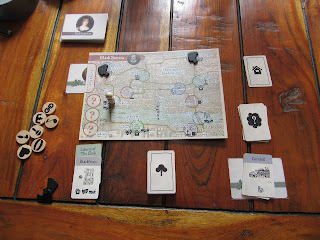The one I have owned the longest (and previously wrote about here) is 'A Blood-Red Banner', in which one has to attempt to defend the Alamo against Santa Anna. Naturally this always results in failure and the measure of success is how badly one fails. While I know that it's thematically appropriate it really does get depressing after a couple of plays. There is a game from the same publishers about Rorke's Drift which I'd like to try, but wonder if it has the same problem in reverse. Production values - at least in the version I own - are a bit cheap and cheerful and the AI is nothing more than a D6 and a deck of pre-printed cards which march the Mexicans up to the walls and invariably, following a very simple combat resolution mechanism, inside.
The second game, Hostage Negotiator, at least gives some chance of succeeding in one's task, although as victory can be obtained even if half of the hostages die success is a bit relative. Once again the AI is cards and a few D6, but the designer has done an excellent job of replicating the paradox and tension of simultaneously trying to keep the hostage holder calm whilst at the same time rescuing those he is holding before time runs out. Play takes the form of a series of conversations during which cards are played both to achieve results now and to set up favourable conditions for future actions. A random selection of demands, threats and events gives it high replayability. There are expansions with extra bad guys etc, but I play it so infrequently that I have always found the three in the starter pack to be sufficient.
The new game I have acquired is 'Black Sonata', in which one wanders around Elizabethan London trying to establish the identity of the dark lady of Shakespeare's Sonnets. It features a very clever mechanism by which the lady herself moves. I'm always on the lookout for ideas that could be utilised for wargaming and this caught my eye immediately as a means of replicating hidden movement in campaigns or even on the tabletop. It doesn't merit the description of AI; rather it seems to be more of a random selection from among a series of pre-programmed routes, with a reset mechanism if you get close, but not close enough. The deduction puzzle at the heart of the game isn't so sophisticated and I can't help thinking that the movement mechanism deserves a better game to go with it. Certainly I have never failed to solve it quite quickly, although one has still to catch the lady even then.
Anyway, all three - when one remembers one owns them - provide a pleasant distraction for fifteen or twenty minutes and I shall endeavour to get them on the table more frequently. In the meantime here's Karen:




